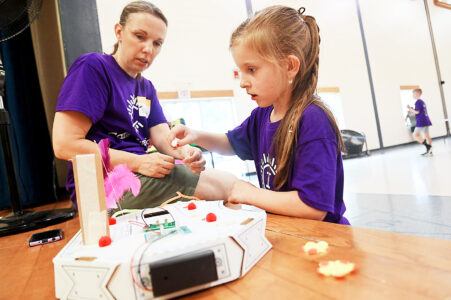Nurse critical of UPMC loses job
Contract employee not retained after speaking on TV about staffing shortages
UPMC Altoona has twice violated the spirit of its recent public assurances that nurses who report safety concerns won’t be disciplined, according to a couple of nurses at the hospital.
The first alleged violation occurred May 15 on the ortho-neuro-trauma unit, when the five registered nurses there were caring for seven patients apiece and collectively refused for each to take an eighth, citing safety concerns — leading an administrator to say their names were headed to the state Board of Nursing, according to nurses Dina Norris and Alec Steele.
The second occurred Tuesday, when UPMC fired Norris, a nurse who had won awards and had never been disciplined, for an alleged policy breach a week after she spoke on a local TV news show about the May 15 incident, Norris said.
The information that was shared by the nurses included inaccuracies, according to UPMC, which has been struggling for many months with short staffing and difficulties hiring enough nurses.
“No one was reported to the State Nursing Board,” UPMC spokesman Ed DeWitt wrote in an email. Further “(t)he nurse who claims they were fired did not face disciplinary action, as they were not an employee of UPMC Altoona, but a temporary agency contractor.”
Apparently, the administrator on duty May 15 didn’t report the five nurses who’d refused to take an eighth patient to the Nursing Board, but she threatened to do so if they didn’t relent — and then said she’d done so when they continued to resist, Norris said.
As for Norris being removed from employment after a year and a half as an agency nurse in Altoona: “Call it what you want,” she said.
Her agency contract was due to expire June 18, but the hospital renewed it for three additional months the day after she appeared on TV. Five days later — following an uneventful weekend at work — UPMC informed her agency that her tenure at UPMC Altoona was over, effective immediately. UPMC asked the agency to include a “do not rehire” note in her file that probably applies throughout the UPMC system, she said.
When her recruiter asked UPMC why it had ended Norris’ employment, UPMC said that her actions weren’t in line with UPMC policies, Norris said.
The recruiter was unable to get anything more specific, she said.
UPMC didn’t say the termination was because of her TV interview, but “of course” it was, Norris said.
It was also a disciplinary action — albeit one that wasn’t in line with the normal disciplinary process at the hospital, which typically applies to agency nurses as well as union nurses, except that agency nurses are at-will employees without union representation, Norris said.
Norris was previously a staff nurse at UPMC Altoona from 2013-15, according to a union spokeswoman.
She has earned two Guardian Angel awards and a DAISY award and was nominated for another DAISY award, according to the spokeswoman.
She has also trained student nurses, graduate nurses, interns and externs, Norris said.
Before Tuesday, she was never the subject of disciplinary action in any job, UPMC or otherwise, Norris said.
Steele, the other nurse who appeared on TV to talk about the May 15 incident, has not been disciplined, Norris said.
He’s a union employee, subject to union protection, and he’s scheduled to leave UPMC anyway next week, she said.
“Alec said a whole lot more than me” on the TV broadcast, Norris said. “But I don’t think they’re going to lean on him.”
It isn’t as if she isn’t needed on the ortho-neuro-trauma unit, which continues to be short staffed, Norris said.
Other nurses supported Norris and Steele for speaking out, but her termination will likely discourage further efforts, Norris said.
“No one wins,” including the nurses themselves, the hospital and patients, she said.
UPMC made the assurances that employees who report safety concerns wouldn’t face discipline to the Mirror early last month.
The organization made them in response to a furor created by a passage in a UPMC management newsletter about an upper management order for nurses to take up to eight patients — although it’s “not ideal, nor is it safe,” with refusal potentially resulting “in an HR (Human Resources) trip.”
The newsletter, shared widely on social media, “was written by an employee (and was) reflective of their own opinions,” stated hospital spokesman Ed DeWitt in an email at the time. UPMC always “encourages staff to escalate any quality or safety concerns, and no nurse would ever face disciplinary action for raising (such) concerns,” DeWitt added then.
UPMC reiterated those prior assurances Thursday.
“We encourage staff to escalate any quality or patient safety concerns, and no nurse would face disciplinary action from UPMC Altoona for raising any related concerns,” DeWitt wrote.
After the events of May 15, Norris “escalated” her version of those events to her unit manager and the hospital’s HR department, Norris said.
HR said it would look into the matter and get back to her if necessary, Norris said.
The five nurses on her unit, which is on the 11th floor, refused to take additional patients May 15 because of “the acuity of our unit and the condition of our patients,” Norris said.
At the time, the five nurses had a total of 35 patients.
When the names of five additional patients appeared on the unit’s assignment board, meaning each nurse would need to take yet another patient, Norris spoke to all the other nurses and everyone said “they absolutely couldn’t handle any more,” Norris said.
She shared that consensus with the administrator on duty, who is in charge of all the nurses in the hospital on that shift, Norris said.
The administrator came up to the unit and asked for more specific reasons than “safety,” speaking to each nurse individually and saying that a report to the Board of Nursing was a possible consequence of refusal, Norris said.
The administrator left, then returned and spoke to each nurse individually again, she said.
At that point, one nurse agreed to take an eighth patient, saying she didn’t want to be reported, Norris said.
The administrator told her that she’d already reported all five names to the board for patient abandonment, Norris said.
That nurse then withdrew her offer, because “what good would it do?” Norris said.
The abandonment charge was based on a policy provision in the nurses’ collective bargaining agreement, the administrator told Steele.
Steele asked to see that in writing, but the administrator told him she couldn’t provide it, Steele said.
No one actually got another patient, so no patients were actually abandoned anyway, Steele said.
Taking eight patients has become virtually the new norm for UPMC Altoona, with most nurses taking that many intermittently, Norris said.
During part of last year, the norm was seven, and earlier that year, six, Norris said.
In 2020, it was five, she said.
Staffing was “adequate” then, she said.
When UPMC first began giving nurses eight patients, it was termed “max surge,” Norris said.
Since early spring, eight has become “expected,” and there’s no longer a special name for it, she said.
Sometimes, when nurses have a high caseload, and management wants to add patients, nurses will engage in bartering, Norris said.
That could mean a nurse is too busy now, but a patient is scheduled for discharge at 4 p.m., so taking another then is feasible, Norris said.
But on May 15, none of the five nurses’ patients were scheduled for discharge, she said.
The pressure to take more patients has created “a difficult work environment,” she said.
“Do I say ‘yes’ to something that may be unsafe to maintain a good relationship with my supervisor?” Norris asked rhetorically. “Or is enough enough?”
Sometimes, supervisors don’t accept that nurses may be doing all they can, she said.
Sometimes, supervisors don’t trust that nurses — based on their expertise as licensed professionals — are really “maxed out,” she said.
“It’s frustrating and discouraging,” she said.
Nurses work hard for their licenses and are inclined not to jeopardize them by agreeing to situations that stretch their capacity for competence, Steele said.
The hospital is committed to “delivering safe, quality patient care,” DeWitt wrote Thursday. “As the region’s trauma and advanced care hospital, our patients depend on us being here to care for them when they need it most,” he wrote.
Norris has lost her source of income in the context of having two teen children and a daughter in college.
“(But) I’m not at all regretful that I spoke up,” she said.
She has “several irons in the fire” for further employment, she said.
Mirror Staff Writer William Kibler is at 814-949-7038.





